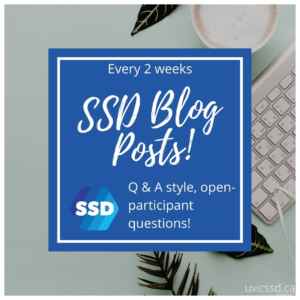Communicating Your Needs
-
When starting a new friendship or relationship, at what time in the relationship do you start communicating your access needs?
“When one is talking too soon about needs, it can scare them away, thus receptivity is less. I felt unsafe and a good foundation of the relationship hadn’t been defined yet , thus sharing something so deeply personal felt uncomfortable.” – Victoria
“I start communicating my needs as soon as I have one in the moment. I may not explain the whole history of why I might need to do something outside of what is considered ‘normal’, but I’ll communicate that I ‘need to eat now; yes, right now’ or say something along the lines of, ‘I’m going to plug my ears while this bus goes by.'” – P.
“One instance I particularly recall is when the helper assigned to me for my access needs, instead of talking to me directly about my needs, chose to ask my friend about her needs. It felt quite offensive, as there is an assumption seeing my physical disabilities is my inability to speak. It was a little shocking too considering he was there to help “me””. – Jennifer
-
How do you use the language of identity to help communicate your needs?
“Prefer to talk in person, see the visuals and feel the emotion and vibes. Make people see them for you who you proudly accept as who you are. “ – Victoria
“Usually use emojis to communicate my feelings/expressions/emotions in a text“ – Jennifer
“I use identity-first language to state that I am a ‘disabled person’. Being disabled is not a moral imposition, it’s a neutral descriptive term that can help to convey some information without being too detailed.” – P.
“I usually go offline on social media platforms and limit my communication with people and tell them I am busy/need space to convey my need. “ – Anonymous
-
In what ways are there limitations to the language of identity/ies?
“When used inappropriately, they become a crutch for life not an opportunity. I shake a lot – part of my disability. I get a lot of glances and judgement from people in public spaces.One time at UVIC bookstore, a staff member was respectful and called me out on the shaking and made the assumption that I was on drugs. The manager took the complaint seriously and dealt with it in an educative manner with the staff and she apologized for her behavior. “ – Victoria
“Sometimes I notice that other people use the language of identity, such as ‘autistic’, ‘traumatized’, or ‘anxious’, to explain why they ‘can’t’ do or explain something, rather than genuinely sit with their discomfort and find a work-around that works for them. I feel that identity-focused language, when a person subsumes a word as a personality trait, can be used to avoid accountability.” – P.
“I am usually physically scanned from top to bottom like I am broken- not really seen for who I am, just my disability.”- Jennifer
“All people have their unique language of identity/ies. So understanding that in everyday life sometimes becomes tough as I don’t want to offend/upset anyone and would want to resolve the issues amicably. “ -A
-
What’s the most recent example of you communicating your access-needs to someone?
“Constantly correcting people to use correct pronouns because of the physical appearance at the campus especially.” – Victoria
“In my workplace they are really respectful and helpful and are very open minded with people with disabilities. There’s no judgment.”- Jennifer
“I sent a text to a group chat yesterday saying that “I’m taking tomorrow off” to indicate that I needed a day away from the chat.” – P.
-
What’s your experience been in communicating your needs to your employer/ staff at the workplace setting? Have they been satisfactory?
“For the most part, it seems from the responses, when the complaint is taken to the upper management, it is usually resolved. Though this might greatly differ from person to person and the place of work as well.” – Anonymous
“My current workplace is disabled-led and organized, so it’s been a bit of a dream to work here. In the past, however, I’ve been illegally fired after communicating to my employer my required workplace accommodations.” – P.
“They are great! They also check in with my mental health every week- making sure I’m not overworked. “- Jennifer
Concluding thoughts
Don’t stare at our disabilities like we are broken, we are still human and capable. Society should be more educated on different aspects and forms of disability/ies.
There’s value in educating society about different access needs, and communicating your emotional, spiritual, mental, and physical needs to others is sometimes necessary.




